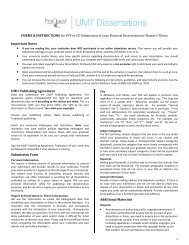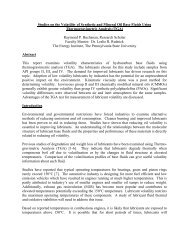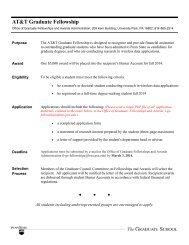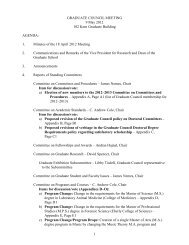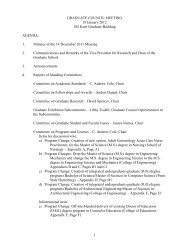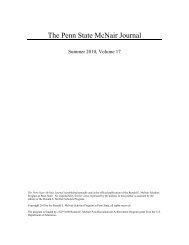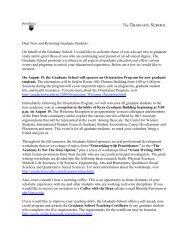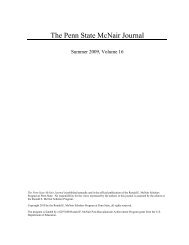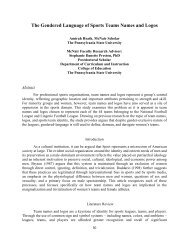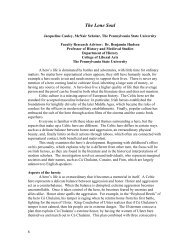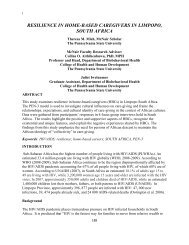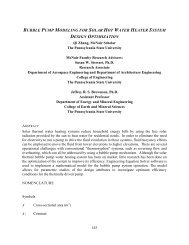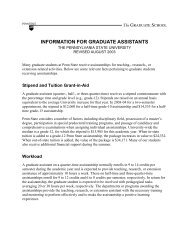LANDING THAT ACADEMIC JOB: THE ART OF GIVING A JOB TALK
LANDING THAT ACADEMIC JOB: THE ART OF GIVING A JOB TALK
LANDING THAT ACADEMIC JOB: THE ART OF GIVING A JOB TALK
You also want an ePaper? Increase the reach of your titles
YUMPU automatically turns print PDFs into web optimized ePapers that Google loves.
<strong>LANDING</strong> <strong>THAT</strong> <strong>ACADEMIC</strong> <strong>JOB</strong>:<br />
<strong>THE</strong> <strong>ART</strong> <strong>OF</strong> <strong>GIVING</strong> A <strong>JOB</strong> <strong>TALK</strong><br />
STEPHANIE T. LANZA, SCIENTIFIC DIRECTOR<br />
<strong>THE</strong> METHODOLOGY CENTER<br />
<strong>THE</strong> PENNSYLVANIA STATE UNIVERSITY<br />
NOVEMBER 5, 2010
Why am I qualified to talk about this?<br />
<br />
<br />
M.S. in mathematical sciences<br />
Ph.D. in social sciences<br />
<br />
<br />
<br />
As Scientific Director of a research<br />
center at Penn State, I have seen<br />
Many great job talks…<br />
And even more flawed ones
Introduction to today’s talk<br />
1. What must your job talk accomplish?<br />
2. Structuring an excellent talk<br />
3. Presentation style counts<br />
4. Tips for conducting an effective Q&A<br />
5. How can you prepare?
What must your job talk accomplish?
What must your job talk accomplish?<br />
Convince people not in your area that you are<br />
the best candidate by explaining:<br />
1. Why the problem is interesting (why should<br />
the audience care?)<br />
2. Why the problem is hard<br />
3. How you have solved it (and that you have<br />
solved it)
Convince your audience:<br />
<br />
<br />
<br />
That you are a great researcher<br />
That you can teach<br />
That you can stand independently of<br />
your advisor
Show them you are a great researcher:<br />
<br />
<br />
<br />
Discuss how you came to your research<br />
focus<br />
Demonstrate academic depth and<br />
breadth<br />
Show where your research is going in the<br />
future
Show them you can teach:<br />
<br />
<br />
<br />
<br />
<br />
Present/communicate clearly<br />
Demonstrate enthusiasm<br />
Make use of various media<br />
Do not assume too much content<br />
knowledge<br />
Answer questions well
Show them you are independent:<br />
<br />
<br />
Demonstrate that you can stand<br />
independently of your advisor<br />
Answer thoughtfully in the Q & A
Structuring an excellent talk
Structuring an excellent talk<br />
<br />
<br />
<br />
<br />
Include an outline/overview of the talk on<br />
a slide near the beginning<br />
Spend first 5 minutes on your background<br />
Then progress to more technical material<br />
End with future research
Tips for an excellent talk<br />
<br />
<br />
<br />
Tell them what you are going to say.<br />
Say it.<br />
Then tell them what you said.
More tips for an excellent talk<br />
<br />
<br />
Have a clear thesis: know what you want<br />
your audience to remember from the talk,<br />
and then tell them those points over and<br />
over in different ways<br />
Make sure researchers outside of your field<br />
can understand your research, if not all the<br />
technical material
More tips for an excellent talk<br />
<br />
<br />
<br />
<br />
Remember: you are not just describing<br />
your research, you are describing you<br />
Make sure the talk is not to long<br />
Be willing to make cuts “on the fly”<br />
Make it clear where the background<br />
if information ends and where your<br />
contribution begins
Presentation style counts
Presentation Style<br />
<br />
<br />
<br />
<br />
<br />
<br />
Don’t talk to quickly or quietly<br />
Talk to the audience, not the screen or<br />
computer<br />
Be inclusive in your language<br />
g<br />
Use “she” as well as “he”<br />
Do not make the powerpoint itt too “fancy”<br />
Try to appear excited, interested, and<br />
dynamic when presenting your research
Tips for conducting an effective Q&A
Tips for an effective Q&A<br />
<br />
<br />
Be prepared! You might have a highly<br />
interactive Q & A or a quiet one<br />
This is reflection of the group, not you<br />
<br />
<br />
Repeat a question so everyone has heard<br />
it<br />
At the end of an answer, do not ask if<br />
you’ve answered someone’s question
More tips for an effective Q&A<br />
<br />
<br />
<br />
Consider preparing a few extra slides<br />
with more technical content, discussion<br />
material, etc. for use during Q&A<br />
Be open to new ideas<br />
Make the faculty member asking the<br />
question feel smart
How can you prepare?
How to prepare<br />
<br />
<br />
<br />
Prepare early; attend talks in your<br />
department to gather ideas<br />
Practice, practice, practice! Rehearse<br />
more than once and in front of an<br />
audience.<br />
Have someone proof your slides and<br />
handouts
Do your research<br />
<br />
<br />
<br />
<br />
<br />
<br />
Know your audience<br />
This should inform content and level<br />
Know big names in the department<br />
Know faculty doing similar research to yours<br />
Backgrounds of Department Head, Dean<br />
Recent departmental news
Summary<br />
Convey that you are a great researcher and<br />
teacher, and can stand independently of your<br />
advisor<br />
Tell them what you are going to say, say it,<br />
and then tell them what you said<br />
Talk to you audience, share your enthusiasm<br />
Be open and honest during the question and<br />
answer session<br />
Practice, practice, practice



